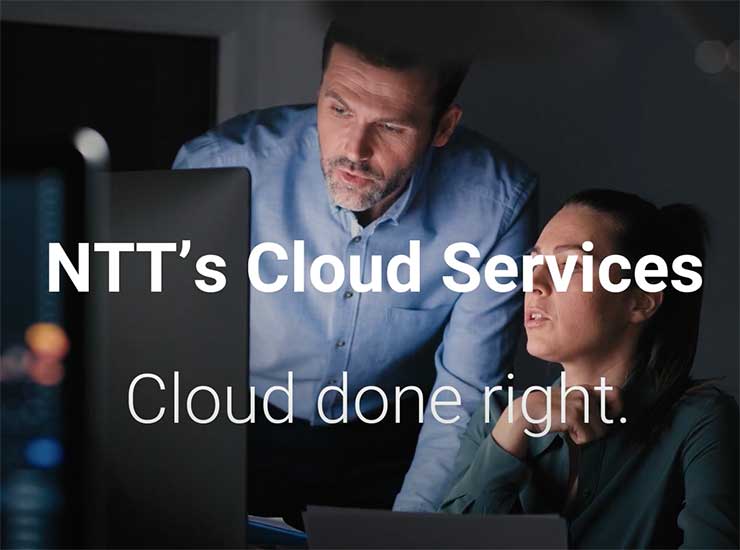-
Featured services
2026 Global AI Report: A Playbook for AI Leaders
Why AI strategy is your business strategy: The acceleration toward an AI-native state. Explore executive insights from AI leaders.
Access the playbook -
Services
View all services and productsLeverage our capabilities to accelerate your business transformation.
-
Services
Enterprise Networking
-
Services
Cloud
-
Services
Consulting
-
-
Services
Data and Analytics
-
Services
Infrastructure Solutions
-
Services
Global Data Centers
-
Services
CX and Digital Products
-
Services
Application Services
-
-
Services
Digital Workplace
-
Services
Business Process Services
-
Services
Generative AI
-
Services
Cybersecurity
-
Services
Enterprise Application Platforms
![]()
Accelerate outcomes with agentic AI
Optimize workflows and get results with NTT DATA's Smart AI AgentTM Ecosystem
Create your roadmap -
-
-
Insights
Insights
Recent Insights
-
The Future of Networking in 2025 and Beyond
-
Using the cloud to cut costs needs the right approach
When organizations focus on transformation, a move to the cloud can deliver cost savings – but they often need expert advice to help them along their journey
-
Make zero trust security work for your organization
Make zero trust security work for your organization across hybrid work environments.
-
-
![]()
2026 Global AI Report: A Playbook for AI Leaders
Why AI strategy is your business strategy: The acceleration toward an AI-native state. Explore executive insights from AI leaders.
Access the playbook -
-
Discover how we accelerate your business transformation
-
About us
CLIENT STORIES
-
Liantis
Over time, Liantis – an established HR company in Belgium – had built up data islands and isolated solutions as part of their legacy system.
-
Randstad
We ensured that Randstad’s migration to Genesys Cloud CX had no impact on availability, ensuring an exceptional user experience for clients and talent.
-
-
CLIENT STORIES
-
Liantis
Over time, Liantis – an established HR company in Belgium – had built up data islands and isolated solutions as part of their legacy system.
-
Randstad
We ensured that Randstad’s migration to Genesys Cloud CX had no impact on availability, ensuring an exceptional user experience for clients and talent.
-
![]()
2026 Global AI Report: A Playbook for AI Leaders
Why AI strategy is your business strategy: The acceleration toward an AI-native state. Explore executive insights from AI leaders.
Access the playbook -
- Careers
Topics in this article
Cloud computing has transformed the technology and business landscape to such an extent that organizations are now paying closer attention to cloud economics as a business discipline in its own right – one that explores the principles that underpin the costs and benefits of cloud.
By understanding factors such as return on investment (ROI), total cost of ownership and, importantly, the opportunity cost of cloud, organizations can go beyond pure cost savings to realize the value of cloud in broader terms.
Beyond its technical capabilities, the cloud brings a powerful economic advantage that enables businesses to optimize costs, increase efficiency and foster innovation. This economic advantage is fueled by two key drivers: the cost efficiencies gained from leveraging the scale and advanced technologies of a trusted cloud provider, and the ability to pay only for the resources used.
Lower infrastructure and operational costs free up budget for reinvestment
One significant benefit of cloud adoption is the consequent reduction in infrastructure costs. Traditionally, businesses had to make substantial investments in physical infrastructure such as servers and data centers. This often resulted in hefty upfront costs and ongoing maintenance expenses.
By shifting workloads to the cloud, our clients have experienced annual IT budget savings of up to 25%. These savings can be reinvested in growth initiatives or returned to the business, providing a significant financial boost.
Moreover, cloud adoption reduces operational spending. Cloud providers take on various operational tasks, including hardware maintenance, software updates, security patches and backups.
Cloud services also offer built-in management tools and automation capabilities, which help to streamline operations and reduce manual labor. This alleviates the burden on businesses, reducing the need for dedicated IT staff and associated costs.
Cost-efficient scaling enables innovation
Cloud service providers offer scalable infrastructure resources on a pay-as-you-go basis. This eliminates the need for upfront investments in physical infrastructure and reduces ongoing expenses such as power, cooling and maintenance.
It also enables organizations to scale their operations rapidly to accommodate fluctuating workloads and market demands. By leveraging this scalability, organizations can pursue innovation initiatives without being obstructed by technical limitations or infrastructure constraints.
Business and IT benefits go beyond costs
The benefits of cloud extend beyond cost savings. Cloud adoption empowers organizations to focus on their core competencies: by offloading infrastructure management to cloud providers, they free up valuable time, resources and talent to concentrate on developing new products and services.
In addition, cloud service providers offer access to cutting-edge technologies such as artificial intelligence, machine learning and big data analytics – all without the need for expensive infrastructure or specialized talent. This opens new possibilities for data analysis, automation and personalized customer experiences, ultimately improving business outcomes.
- ALSO READ → What is multicloud as a service?
Topics in this article
FinOps advisory and managed services deliver tangible benefits
If cloud economics is the research discipline that seeks to understand how all these drivers work together for cloud-cost optimization, FinOps (finance + DevOps) is the methodology and framework that enables organizations to get maximum business value from the cloud. FinOps focuses on the collaboration of several areas of the business in making data-driven spending decisions.
At the core, FinOps is the catalyst that amplifies growth and innovation. FinOps is where your business, technology and finance teams meet to share responsibility for everything cloud: cost controls, operations, governance and oversight, and resource allocation. To be successful, it needs to be part of your organization’s culture – and this could take some effort to achieve, particularly if you’re dealing with complex cloud environments or lack the skills or tools to facilitate the adoption of FinOps.
NTT’s FinOps Cloud Advisory service: a deflationary force in an inflationary economy
A managed service provider like NTT that understands all the mechanics of cloud economics and offers comprehensive solutions across the technology stack can help you get from theory to practice faster.
Our FinOps Cloud Advisory service analyzes your cloud environments, identifies areas for cost savings and minimizing risks, and develops customized strategies to streamline financial operations.
By integrating this service with our Managed Cloud Services, we can ensure maximum optimization and scalability for our clients. In fact, our case studies have shown an ROI of between 400% and 1,000% from integrating our cloud advisory and innovation solutions, demonstrating the tangible value our solutions bring to businesses.
Through the adoption of cloud services, organizations can optimize expenses, focus on core competencies and leverage cutting-edge technologies. The cloud’s scalability, agility and collaborative capabilities create an innovation-friendly atmosphere that facilitates rapid growth.
With cloud economics as their guide, organizations can confidently navigate the digital landscape, driving innovation, maintaining competitiveness and flourishing in an ever-changing business environment.
Request a Cloud Economics Workshop and get a kickstart on cloud cost optimization.





